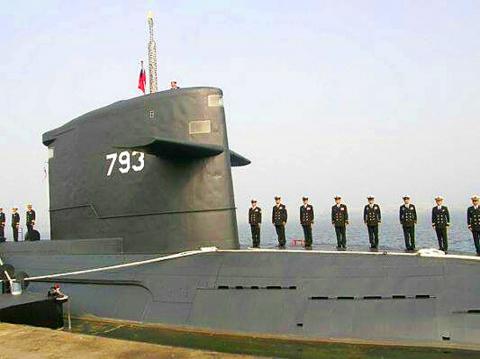The US Department of State has approved a marketing license needed for US manufacturers to sell technology to Taiwan that would enable the nation to build domestic submarines, the Ministry of National Defense said yesterday.
Ministry spokesman Major General Chen Chung-chi (陳中吉) said in an interview that the ministry has received reports that the state department has agreed to grant the marketing license required for the sale of technology that Taiwan needs to develop indigenous submarines.
Presidential Office spokesman Sidney Lin (林鶴明) confirmed the report, saying that the State Department notified Taiwan’s representative office in the US that it would provide the license.

Photo Courtesy of the Ministry of National Defense
This decision would not only help upgrade Taiwan’s self-defense capabilities, but would also benefit regional safety and security, Lin said.
The Presidential Office and the ministry thanked the US for its commitment to the Taiwan Relations Act and the “six assurances.”
“As a result, Taiwan will become more militarily self-sufficient,” the ministry said.
Democratic Progressive Party Legislator Wang Ding-yu (王定宇), who sits on the legislature’s Foreign Affairs and National Defense Committee, also thanked the State Department for “making a righteous decision” and supporting Taiwan, “a nation with democratic values the same as those of the US.”
Wang said he hopes that remaining talks go smoothly, adding that he is very optimistic about the nation’s indigenous submarine-building program following a visit to a shipyard last week.
“The nation’s defense program most needs to improve its underwater combat capabilities, which it should have done 10 years ago,” he said. “The nation’s development of submarines is already 20 years behind schedule, but better late than never.”
“The announcement from the US is the first step. Whether we are talking about components, systems or other technology, US manufacturers would still need to obtain export permits,” Wang said. “Nevertheless, this act from the US Department of State is a great start.”
The friendliness shown toward Taiwan by both the US Senate and House of Representatives is historically the best it has ever been, he said.
The US is taking care of the combat systems the nation’s submarines would use, and if export permission for those systems is granted, the nation’s submarine program would be ready for action, he said.
Once basic blueprints for the submarines are complete, schematics can be worked out, Wang said, adding that export permission for the components would take about one year to acquire.
After components are received, production and assembly can begin, he said, adding that work should be completed according to schedule and the quality and combat-effectiveness of the finished submarines is expected to be excellent.

CHAOS: Iranians took to the streets playing celebratory music after reports of Khamenei’s death on Saturday, while mourners also gathered in Tehran yesterday Iranian Supreme Leader Ayatollah Ali Khamenei was killed in a major attack on Iran launched by Israel and the US, throwing the future of the Islamic republic into doubt and raising the risk of regional instability. Iranian state television and the state-run IRNA news agency announced the 86-year-old’s death early yesterday. US President Donald Trump said it gave Iranians their “greatest chance” to “take back” their country. The announcements came after a joint US and Israeli aerial bombardment that targeted Iranian military and governmental sites. Trump said the “heavy and pinpoint bombing” would continue through the week or as long

TRUST: The KMT said it respected the US’ timing and considerations, and hoped it would continue to honor its commitments to helping Taiwan bolster its defenses and deterrence US President Donald Trump is delaying a multibillion-dollar arms sale to Taiwan to ensure his visit to Beijing is successful, a New York Times report said. The weapons sales package has stalled in the US Department of State, the report said, citing US officials it did not identify. The White House has told agencies not to push forward ahead of Trump’s meeting with Chinese President Xi Jinping (習近平), it said. The two last month held a phone call to discuss trade and geopolitical flashpoints ahead of the summit. Xi raised the Taiwan issue and urged the US to handle arms sales to

State-run CPC Corp, Taiwan (CPC, 台灣中油) yesterday said that it had confirmed on Saturday night with its liquefied natural gas (LNG) and crude oil suppliers that shipments are proceeding as scheduled and that domestic supplies remain unaffected. The CPC yesterday announced the gasoline and diesel prices will rise by NT$0.2 and NT$0.4 per liter, respectively, starting Monday, citing Middle East tensions and blizzards in the eastern United States. CPC also iterated it has been reducing the proportion of crude oil imports from the Middle East and diversifying its supply sources in the past few years in response to geopolitical risks, expanding

Pro-democracy media tycoon Jimmy Lai’s (黎智英) fraud conviction and prison sentence were yesterday overturned by a Hong Kong court, in a surprise legal decision that comes soon after Lai was jailed for 20 years on a separate national security charge. Judges Jeremy Poon (潘兆初), Anthea Pang (彭寶琴) and Derek Pang (彭偉昌) said in the judgement that they allowed the appeal from Lai, and another defendant in the case, to proceed, as a lower court judge had “erred.” “The Court of Appeal gave them leave to appeal against their conviction, allowed their appeals, quashed the convictions and set aside the sentences,” the judges